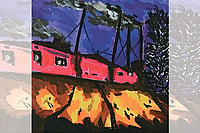Rushdie's latest novel, Fury, is set in the noise of New York City. The central character is a Rushdie lookalike, Malik Solanka, who was born in Bombay and educated in England. At the age of 55, he has moved across the Atlantic to America. In his new home, where his sleep is interrupted by phone calls from the wife and the child he has left behind, Solanka learns that New York City was teaching him a lesson: "There was to be no escape from intrusion, from noise. He had crossed the ocean to separate his life from life. He had come in search of silence and found a loudness greater than the one he left behind."
Unfortunately, the noise in the novel is such that the reader is barely able to hear the story that one assumes Rushdie wants to tell. This noise is the narrator's own voice, talking about Solanka and the world around him.
Solanka has metamorphosed from a dull academic at Cambridge into a rich dollmaker and storyteller on television and the World Wide Web. His past and present occupations meld. Now, Solanka mixes essayistic observations on social phenomena with stories mainly about his difficulties, but mostly successes, with women, women, and women.
This particular mix of interests has been recently explored with some subtlety by Philip Roth in The Human Stain and The Dying Animal. Saul Bellow's last novel Ravelstein also comes to mind for part of the same reasons. But, the comparison doesn't fit. Like Roth and Bellow, even if with greater volubility than either, Rushdie can deliver lucid lines on the state of our complex world; again like them, he also explores in this novel, although with an embarrassing sentimentality, sexual ecstasy and human finitude. However, unlike the two American writers, Rushdie's real theme is success. Sex is only a substitute for, or perhaps only proof of, what Rushdie really cares about, which is stardom.
Is this the attention-seeking reaction of one who had found his face on the cover of Newsweek and Time after the fatwa? Or is it perhaps the response of a writer who has suffered for a whole decade what Solanka calls in another context the "tragedy of insulation"? Or is it that Rushdie is, indeed, the centre of the universe, and you and I just don't know about it?
The Ground Beneath Her Feet was a nearly 600-page-long anthem to the love of Vina Apsara and Ormus Cama, two world-famous rock stars. Fury, even though half the size of Rushdie's last work, remains equally starry-eyed about global popularity. It is this rather than the mythical story of the furies—the three women in Solanka's life—that provides the novel its underlying theme. The noise, then, that is likely to drive the reader to fury is that of the narrator speaking endlessly of unimaginable success and wealth and chic consumer products even while appearing to denounce them.
Early in the book, we are told that Solanka has decided on "using the material of his own life and immediate surroundings and, by the alchemy of art, making it strange". The Russian Formalists, and other proponents like Brecht, called this aesthetic principle "the alienation effect" or estrangement. You do not need a degree in psychoanalysis to see that the estrangement that really propels Fury is of another sort. We usually call it divorce.
The failure in love gives fury to Solanka's life and the others around him. Solanka's best friend Jack Rhinehart is a journalist. After we have been told that his refrigerator is stocked with "larks' tongues, emus' testicles, dinosaurs' eggs", we are also told that he has stopped writing meaningful journalism. Instead of visiting the war zones, Jack has begun writing "lucrative profiles of the super-powerful, super-famous, and super-rich". He has turned to writing novels that chronicle the loves, the misdeeds, the sexual practices and the cars of the rich. These novels are about "the lives of today's Caesars in their Palaces". The reason that Jack has started writing this trash is that his exotically beautiful, estranged wife has been squeezing him for money. The "long, languid, pale" Mrs Rhinehart has "the sticking power of a leech".
It took me a while to see that the book I was holding in my hand pretty much mirrored the description of Jack's writing. But, even after I had finished reading the novel, I still could not decide whether Rushdie was publicly venting his fury about what he thought had led to a degradation in art, or, in a way that was equally pathetic, he was simply seeking to justify the book he had now written about it.


























